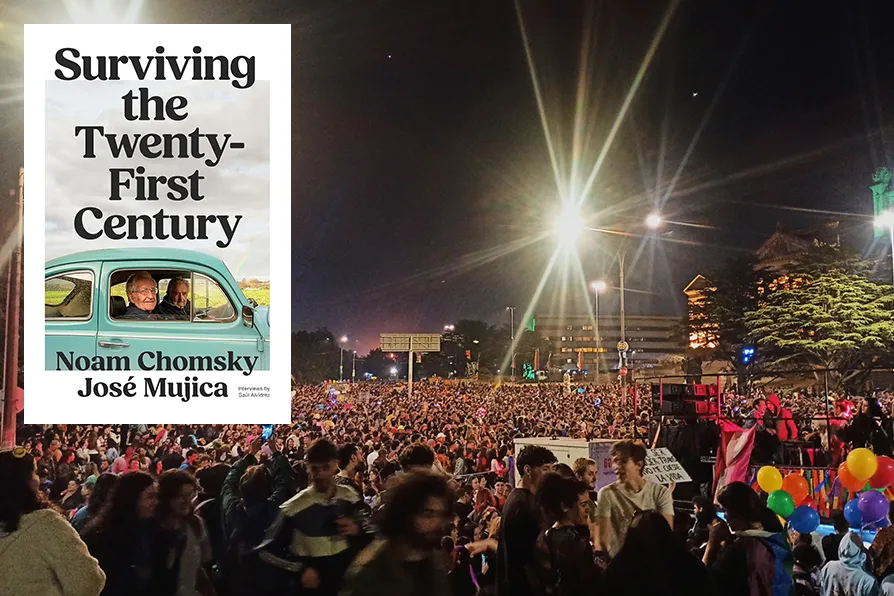JOHN GREEN, MARIA DUARTE and ANGUS REID review Fukushima: A Nuclear Nightmare, Man on the Run, If I Had Legs I’d Kick You, and Cold Storage
GORDON PARSONS enjoys the wealth of wisdom and the clarity of expression from a dialogue between Chomsky and Mujica

 The massively attended March for Diversity, 2024, Montevideo, Uruguay [Pic: Alejandro albertti/CC]
The massively attended March for Diversity, 2024, Montevideo, Uruguay [Pic: Alejandro albertti/CC]
Surviving the Twenty-First Century
Noam Chomsky and Jose Mujica, Verso, £12.99
FROM its title, the hasty reader could be forgiven for believing this book to be a rather corny self-help paperback. The authors, however, two men who have devoted their lives to analysing and, in their different ways, engaging with the ills facing our world, demand attention from anyone interested in an ever-more fragile and dangerous future.
Jose Mujica, a leader of the Tuparmaros Uruguayan independence guerilla movement in the 1970s who became president of the country in 2010, died aged 89 in May this year, while Noam Chomsky suffered a major stroke in 2023.
Saul Alvidrez, a Mexican activist student, exiled by Enrique Pena Nieto’s corrupt government in 2012, recognised these two men shared “an opposition to the individualist and competitive culture of capitalism … And the need for a more collective, collaborative logic for our politics.” The book serves, sadly, as their last words.
Alvidrez is to be thanked for having brought them together for the first time and focusing their discussions and contributions on issues such as culture, technology, neoliberalism and neofascism, the wars on terror and drugs and the role of the US, Latin America, Europe and China, along with more personal observations on contemporary values.
Transcripts of interviews and discussions filmed for a documentary provide most of the basis for this book.
Although their respective observations differ in tone, Mujica — or Pepe, as he is more affectionately known — retains many of his peasant family roots and lifestyle, while Chomsky speaks with the authority of a world intellectual. They share an awareness of the reasons the world, according to the Doomsday Clock, now stands at two minutes to midnight.
Chomsky: “Humans have constructed two huge sledgehammers poised to destroy us [nuclear weapons and climate catastrophe] with others waiting in the wings. Human intelligence has created a perfect storm. If it continues to rage, the human experiment is unlikely to survive very long.”
Mujica: “I think the big question is whether humankind will have time to make amends for the disasters it has inflicted on nature.”
On all the issues addressed, both recognise that the core problem is essentially the system that dominates our world, capitalism.
Mujica: “Consumerism is … an ethic needed for capitalism in its struggle for infinite accumulation. The worst problem for capitalism would be for us to stop buying or to buy very little. And this has generated the consumerist culture that envelops us.”
Chomsky: “If you manage to create a world in which the social unit is you and your TV and nothing else, or you and the shopping mall, or you and the cell phone … if you achieve that, then you can control people because they don’t work together.”
Perhaps the most important section of these exchanges is that on democracy, which in reality today is plutocracy. Mujica is clear that the concentrations of wealth are the greatest threat to democracy and that the exercise of [real] democracy is based on collective participation involving the permanent clash and exchange of ideas.
It is not that the observations, information and arguments brought to bear on so many aspects of our lives, including modern history, economics, politics and social and individual relationships within the capitalist world, are startlingly original. However, the wealth of wisdom and the clarity of expression will make for an enjoyable read for book readers on the left, and also less-informed friends will profit.
These are not the thoughts of two old men at the end of their lives. Remarkably, they do look with hope towards young people “who demand that we escape from a suicidal path.”









